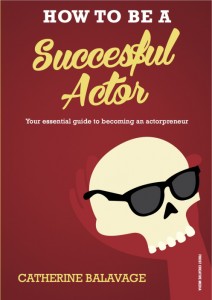 To train or not to train, that is the question. To paraphrase some little known writer, ahem. It is a debate that has raged on. The truth is, there is no easy answer. Frankly, studying at Cambridge will get you noticed but training at some random never-heard-of polytechnic won’t do you much good. In a recent Mark Strong Acting masterclass I went to Mark made the excellent point that it is not the training that is important, but the confidence it gives. Sometime people who don’t train have a chip on their shoulder, Mark said, much like people who don’t go to university think they missed out on something. It is all rubbish and in fact they did not miss anything at all, but the lack of confidence is there.
To train or not to train, that is the question. To paraphrase some little known writer, ahem. It is a debate that has raged on. The truth is, there is no easy answer. Frankly, studying at Cambridge will get you noticed but training at some random never-heard-of polytechnic won’t do you much good. In a recent Mark Strong Acting masterclass I went to Mark made the excellent point that it is not the training that is important, but the confidence it gives. Sometime people who don’t train have a chip on their shoulder, Mark said, much like people who don’t go to university think they missed out on something. It is all rubbish and in fact they did not miss anything at all, but the lack of confidence is there.
So, do you need three years worth of training? Especially with the exorbitant fees that universities now charge? The answer is yes, and no. There is still a hierarchy to acting. If you go to a school which is a brand name it will look great on your CV and open some doors. RADA is one, as is Central and LAMDA. Ditto Oxford and Cambridge. The acting industry is just as snobby as the wider world. People love brand names.
Some training is smart. Although I believe that acting is a talent you either have or don’t, but you can improve. Take classes, join improv groups, make your own work. Keeping up your skills as an actor is important but just doing three years of training for the sake of it is not. Many great actors have no formal training. You will also have the added bonus of not having any debt which will take you years to pay off.
In the end the decision is yours. Just don’t think that your acting career is over before it began just because you cannot go to a prestiges school. Not everyone has the money to do so and they only take a small number of applicants every year. Developing your skills is important but this can be done on the job, doing student films, fringe theatre, in drama classes and even in (shh) amateur dramatics. None of this has to go on your CV. Just get out there and work. The acting industry is not the closed shop it used to be. Go to the theatre, watch film and TV. Learn as much as possible. Actors who went to one of the top schools may get a head start but the good news is that the acting game is a marathon, not a sprint.
Catherine Balavage has been an actor for over ten years. Her book on acting, How To Be a Successful Actor: Becoming an Actorpreneur, has gotten numerous five star reviews and has been called the ‘best advice available’ by numerous sources.

